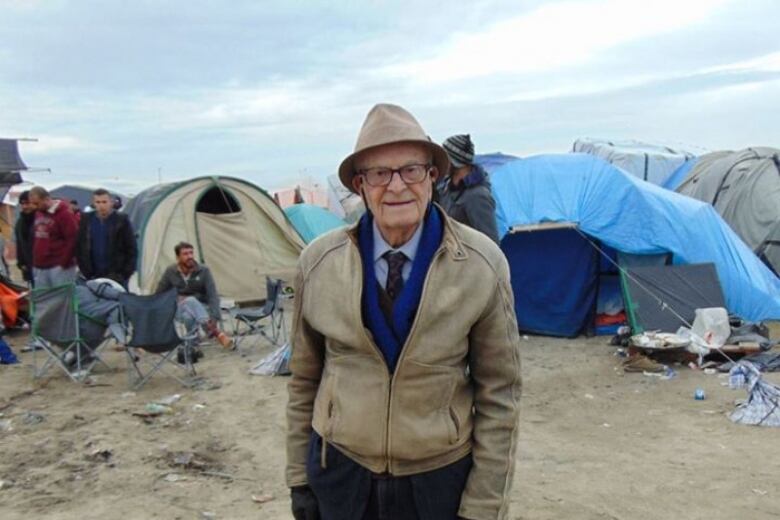'A shining example': Son of activist Harry Leslie Smith vows to carry on father's legacy
The WW II veteran and writer died Wednesday morning at 95

The son of Harry Leslie Smith is remembering his father as a "beautiful person" — and is making plans to carry on his dad's work.
On Wednesday morning, Smith — the anti-poverty activist and author who made Canada his home — died at 95 in Belleville, Ont.
Born to a poor family in England, Smith lived through the Great Depression and served with the British air force during the Second World War.
After his retirement, stirred by the financial crisis, he started to write — and penned several books including Harry's Last Stand. He also publicly spoke out against poverty, stood up for refugees, and pushed for more robust social programs.
John Smith, who has been sending out messages from his father's Twitter account in recent days, remembered his father with As It Happens guest host Susan Bonner.
My condolences on the loss of your father.
Thank you very much. It is like I've told people ... watching him die was like watching a beautiful exotic species go extinct.
[Your father] went personally to refugee camps like the one in Calais. What was he thinking, that he wanted to go there personally?
Refugees are generally very young people. He was showing them that he was a bridge to history and telling them, "When I was a young man, I remember a similar refugee crisis and then the world took notice and took action and this is what we have to do again."
He told them not to despair.
The most amazing thing is when Harry was more or less on his deathbed, the minister of citizenship and refugees came to visit him to thank him. But Harry was there still advocating for refugees and telling him, "There is not enough time. We must do more."
That's how strongly he believes that this refugee crisis is just as dire as the one that he saw in 1945, and that if no action is taken there will be terrible repercussions.
In these days, he's an old man now — but his talks are packed to the gills with young people. What is it that you think drew all these young people to listen?
Number one is that he comes from the greatest generation.
They're millennials. They're not going to blame him for the ... greed of the baby boomer generation.
He was something that was a shining example.
He also told them that he believed that the millennials would be the 21st century's greatest generation.
He said that they had the same gumption as his generation and that they will affect change for the good, and probably — and hopefully — fix things better than his generation did so that the next time we reconstruct a social welfare state it will be for the many and not the few.
Harry said to me some time ago, "If you saw thousands of refugees wearily dragging their feet along the dusty roads of war, in your youth & now in your old age you see the same thing happening again to innocent people and do not raise your voice against it you've got no humanity"
—@HarryslaststandWhat was it that brought [your dad] to Canada?
He had some job changes that he came to Canada for. But also, because him and my mother wanted a start in a new country — a country that was filled with hope and opportunity and wasn't carrying the baggage of Europe.
Both my mother and Harry always thought that the best thing that had ever happened to them was to become new Canadians.
So many people have been following the very public story of Harry Leslie Smith, but what was he like as a dad?
He was fantastic. He was a beautiful person. A very kind person. Understanding.
He never looked askance at any of his children or any of their decisions … He would always defend us.
He loved to laugh. He loved to have a good time.
He was just a very good man that wanted to make sure that all of his children were protected and that he could give them a very nice life — and he did.

You tweeted: "I know exactly what my steps are. I will follow in his footsteps. I will endeavour to finish his projects." [Is that] what you think your father wanted?
Yes. We had talked about this when he was well. He had urged me, because we were partners, collaborators in this entire endeavour … he asked me to continue it on, if he should ever become ill or die.
He did not want his legacy to disappear and he trusted my beliefs and my vision and my talents to ensure that his legacy does not diminish as people forget his life.
I was very privileged that Harry was more than my dad, he was my friend.- John Smith, son of Harry Leslie Smith
What's one of the first things you'll try to do?
The first thing that I'll try to do over the next couple of weeks is I'm going to probably fly out to the migrant caravan in Mexico.
I am going to start meeting people there that I know through our own connections and start using his social media platforms to highlight what I'm seeing in memory of Harry, and reminiscing about Harry, and what Harry saw through these things.
I was very privileged that Harry was more than my dad, he was my friend. We confided in each other about everything.

Written by Katie Geleff. Interview with John Smith produced by Imogen Birchard. Q&A has been edited for length and clarity.